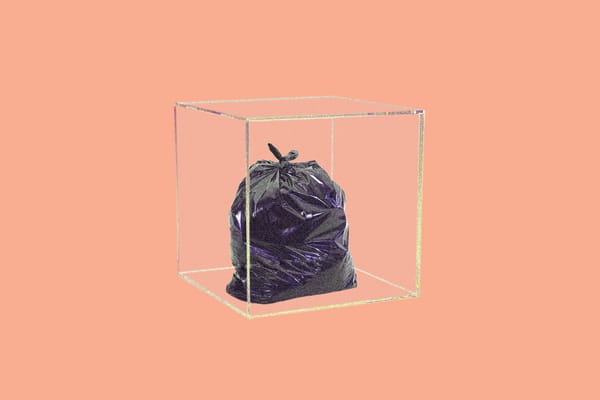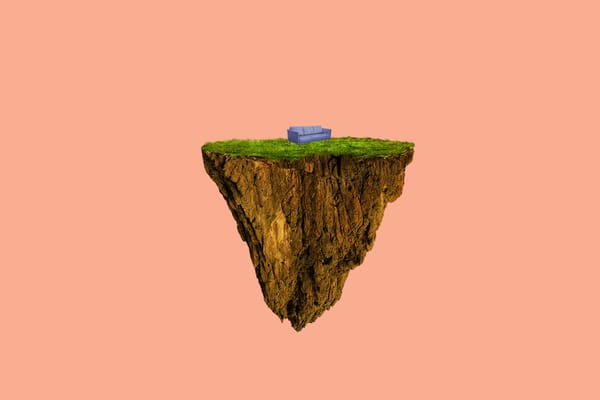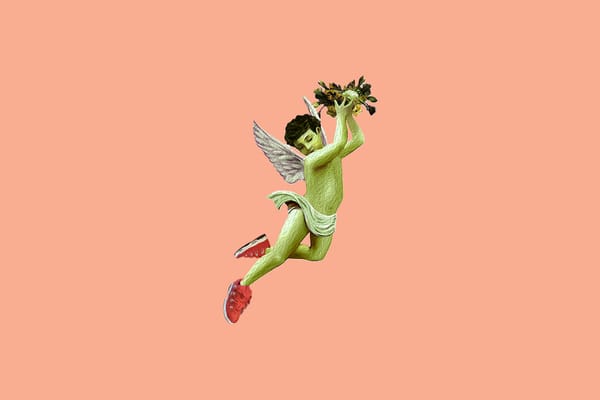Here we are, where we have always been
Chris Cole and skateboarding’s foundational inability to hold itself — and its heroes — to account.

“I think it's time you talked about Cole.” Read a recent comment on the SLAP messageboard topic for this newsletter.
The poster was referring to professional skateboarder and two-time Thrasher Magazine “Skater of the Year” Chris Cole. On May 14, Cole’s ex-wife Christine Flannigan made an Instagram post explaining the origin of “Red,” a nickname she’d gone by for years, which she was now publicly denouncing and asking others to stop using.
“I realized the other day that I still have a ton of trauma from my former life. My name was taken from me. It wasn't a choice. When I told my ex my name, he replied, ‘That will never work. We can't have the same name, and I'm more famous, so I win… Plus, I've always wanted a Red.’
“That is literally what was said to me. I was instantly their property and treated [as] subhuman. I hated it, but lost the battle and it stuck for far too long. He took my name away, and then systematically proceeded to take [everything] else from me thereafter. My education, my career, my control, until he one day nearly took my life.”
A few days later, Flannigan shared a series of Instagram Stories stating that she was “being threatened with a lawsuit [by Cole] if I don't take my post down and issue a retraction. I'm not going to do that. Not one thing I said was a lie, and the truth is worse than my post even alluded to.”
In the weeks that followed, Flannigan would go into disturbing detail, sharing photos of bruises she alleges are from altercations with Cole, along with emails and text exchanges where Cole appears to admit to physically assaulting and restraining her and, in at least one instance, threatening, “I’m going to kill you.”
Their son would corroborate his mother’s accounts, posting on Instagram:
“Recently [my mom] has gone public to tell her story. What she had to say wasn’t easy for anyone to hear. She endured years of emotional and physical abuse at the hands of my dad. l don’t believe anyone could walk away standing strong after the life she has lived, except her. She has been through hell and back to promote the best life my family and I could possibly have, even when it made her life hell once again. This person, my mom, doesn’t deserve to be called a liar, manipulator, or abuser for seeking the support she so deserves. Those of you who oppose that fact can kiss my friendship and respect goodbye because if you aren’t with her, you’re not with me. This is my mom, and I love her more than anyone could ever understand.”
Last week, Flannigan took to SLAP, posting in the topic dedicated to the issue that Cole’s legal threat demanded “a retraction or else… face hundreds of thousands of dollars in a lawsuit and settlement.” Essentially, a SLAPP (Strategic lawsuits against public participation) suit.
On the messageboard, Flannigan said that she’d hired an attorney, “but in order to fight this in court, it will cost me greatly” and that “my hope in releasing evidence was to prove that what I am saying happened really did happen.” She also detailed further harrowing allegations of rape, physical violence, and threats of violence Cole made against their children.
Cole publicly denied Flannigan’s claims, writing in an Instagram Story, “The accusations of my ex-wife are beyond shocking and categorically false. As hard as it has been to hold off on commenting on the situation, I have kept silent because children are involved and this is obviously traumatic.”
Following his son’s comments, he’d post again, “weaponizing and involving children is incredibly traumatic and unfair to them. If these accusations we're [sic] true they'd be handled in a court of law, not through court of public opinion and kids [sic] social media. I will make a statement when it won't further harm my kids.”
As a result of the allegations, Cole has been dropped by several of his sponsors. Deluxe confirmed to me that Spitfire Wheels and Thunder Trucks released him a few days after Christine’s initial Instagram post, and Zero Skateboards owner Jamie Thomas posted a statement to SLAP on July 26 confirming Cole’s dismissal. I reached out to Cole’s shoe sponsor, Fallen Footwear, for comment but did not hear back by the time of publication. (As of this writing, the “team” page on the fallenfootwear.us website returns a 404 error while the same page on a number of their other international licensee sites, including Australia, Canada, Columbia, Mexico, and Chile, are live and feature Cole. The Europe and Argentina sites, the latter where Fallen is headquartered, do not.)

To make serious claims like these on social media, as Flannigan has, is generally a last resort. At the height of the #MeToo movement, a flood of online callouts were made in a messy, desperate grasping for accountability from a society that still refuses to hold abusers to account. It’s an imperfect tool, to be sure. It opens up victims to additional trauma, threats of defamation, and the gawking of outsiders into their personal struggles. But when the legal system or whisper networks fail, what option does a person have? The public callout can be effective in protecting others from the potential dangers posed by an abuser and in helping a victim reclaim their agency. Still, like our carceral system, we don’t have structures in place for what comes after that allows for genuine restorative justice. To choose this course of action takes courage, for it is nothing but fraught.
In her post on SLAP, Flannigan explained that what she wanted was to “tell my story” and for “my friends and family to know who the hell I am. Some of my own family didn’t know this happened. Telling people 1 by 1 is excruciating and impossible. I’m happy I spoke up in the way that I did. I have found more of a community than I have ever had in my entire life. I am closer to my current friends and have rekindled lost friendships that were divided by the isolation during my marriage. In that regard, I succeeded. People can see me now.”
Flannigan also shared that her “goal right now is to find a way to create a system that helps PREVENT domestic violence in this community, educate enough people to identify the warning signs before it’s too late or too far gone, and to hopefully bring in some sort of reporting system that isn’t centered around cancelling someone, but is there to give victims a lifeline in this industry that they so desperately need. It could serve to get the aggressors help that they desperately need, too! I just don’t want this to happen anymore.
“I spent 10 years sitting next to people in the industry that I loved and cared about. I felt like they loved and cared about me, too, and I wanted so desperately to tell them what was happening. They were RIGHT THERE. We could have gotten help! But I was too scared that I would ruin my kid's lives, I would be retaliated against, or it would just be ignored. I believe that if the owner of the companies that my ex rode for were different, my entire life would have been different. I don’t want that to happen to other victims of this. I want victims to be able to get help. That’s it.”
“Writing eloquently about geeky trivialities while one of the great legends of the sport turns out to be a rapist monster, well... I'd rather you use your talent where it's needed.” The poster in the SLAP messageboard topic for this newsletter continued.
The comment was an interesting blend of flattery and shaming. But I understood its intent and tone and also why it would be addressed to, in frank terms, a part-time blogger. In skateboarding, “journalism” only exists in fits and starts. What’s left of the traditional media ecosystem focuses on entertainment, not news. In fact, that’s all skateboarding media has ever been: entertainment and brand promotion.
Serious skateboarding-related reporting either happens on the margins, in blogs and the like, or, if a story is big enough, it’ll get picked up by a mainstream outlet. What’s left of traditional skate media either doesn’t have the ability or will to cover challenging stories. In the January 2023 issue of Thrasher, Nyjah Huston finally addressed and denied the sexual assault allegations swirling around him, rumours that had been ongoing for years. Interviewer Atiba Jefferson’s follow-up question to Huston’s denial was, limply, “What’s the best part of being a pro skater?”
When Johan Stuckey and Yonnie Cruz were separately called out on social media in 2020 and 2021 for knowingly having unprotected sex with unwitting partners while carrying STIs, those stories never made it past the SLAP messageboards, Instagram, or blogs. In any other sport, those would have been front-page scandals. Both skaters were eventually dropped by all of their sponsors, but only because the online pressure became too great for those brands to ignore.
In 2018, SLAP users brought attention to Jason Jessee’s extensive history of abhorrent, racist tirades. It was huge news in the bubble but did not get coverage beyond SLAP, VICE, and social media. Kyle Beachy would eventually write “Primitive Progressivism,” which looked at Jessee’s ugly past and the skateboarding industry’s foundational complicity in its lack of self-scrutiny. In the piece, there is a particularly illustrative anecdote about why that is.
“...I’m not sure many skateboarders realize just how small and insular the US skateboard industry really is. The slightest look behind the curtain reveals about 120 people, 150 max, cramped into a cozy pyramid; everyone knows everyone else. Nor might the average skater realize just how concentrated the power is at this pyramid’s top. In 2012 I was surprised to receive an email from Dave Carnie, a writer I’ll argue is second only to Stecyk in terms of importance to skateboarding. It seemed that Carnie had read my profile of Andrew Reynolds and wondered about doing something on Steve Berra. I’d have to be careful, he warned, because he’d have to give Berra final review of whatever I wrote. When I said, basically, hold on you’re Dave Fucking Carnie, he explained how Berra had the power to yank advertising and thus was not someone to fuck with. He admitted that this was not very punk rock, but unfortunately he had to consider the reality of the situation.
“The next time you wonder why there is no such thing as hard-hitting skate journalism, consider Dave Carnie, the most radical and subversive writer in the history of skateboarding. Consider a world in which someone so overtly narcissistic and fragile as Berra is granted control over how he’s covered. Or consider other real-world practices that are missing from skateboarding—things like labor unions, or organizations that might offer any other kind of protections for pros and amateurs. Consider how fragile is the existence of all those skaters hustling for some small space inside the pyramid. A single injury—like Jason Jessee’s broken leg in 1991—and they’re done.
“Consider how frightening this must be, knowing how profoundly replaceable you are. And considering all this, it begins to make sense that no skaters, or writers, or other industry figures were interested or brave enough even to comment on Jason Jessee’s swastikas. Skateboarding’s history of blacklisting is fairly short, officially, but the lessons are stark. Anyone, everyone can be replaced.”
Beachy initially pitched “Primitive Progressivism” to Jenkem, who turned it down. King Skate (then King Shit), a publication I wrote for for many years, published it on their website before removing it a day later. The companies that sponsored Jessee and paid for ads in the magazine that allowed it to exist were not happy. The editorial capture Beachy had described in his piece, that piece suffered. Free Skate Mag soon gave it a home where it still exists today.
In the intervening years, little has changed. Things may have even regressed as more media outlets fold and the risk of angering those handling the purse strings increases. Still, Chris Cole is one of the biggest names in the sport. Skateboarding’s premier magazine, Thrasher, dubbed him the planet’s best skateboarder twice. While he is in the twilight of his career, that doesn’t change his impact on the culture.
Yet, the only places Flannigan’s allegations have been covered are, once again, on SLAP, social media, and in the margins. Longtime skateboarding media personality, Rob Brink, interviewed Flannigan for an upcoming episode of his podcast which, even in the short clips released so far, stands as the most in-depth look to date. Various YouTubers have regurgitated the SLAP topic to their audiences. Skateboarding’s sordid TMZ clone, ShreddER News, which has a clear mandate for obscenely exploiting skateboarding-related stories for engagement along with fawning over far-right bigot Tim Pool and spewing transphobia, posted about the allegations 18 separate times between July 12 and August 5.
The hosts of The Nine Club podcast, which, for better or worse, is a central node of the current skateboarding media ecosystem, sputtered when a viewer who donated $100 to ask a question on Nine Club Live asked to get their thoughts on the allegations.
“I don’t know too much about it, honestly, but thank you for the donation,” Chris Roberts said, quickly closing the door on the conversation. “It’s a lot to touch on. You leave certain things alone.” Jeron Wilson followed up, slamming the door shut.
But is that not the purpose of entities like The Nine Club, to talk about what’s happening in skateboarding? If you “try to avoid all that negative crap,” as Roberts once phrased it when DM’d about Jessee in 2018, it allows for the hard-to-talk-about stories to fester, shunting accountability to the wayside. And it signals to those impacted, as well as the skateboarding community at large, that the media and industry simply don’t care. The hosts of The Nine Club are obviously not equipped to have these conversations, as their eventual episode with Jessee attests. But considering their station, they should at least try because “you leave certain things alone” does not apply to one of skateboarding’s all-time greats being credibly accused of serious and heinous crimes.
This is where skateboarding has, by design, left itself in a lurch. By not supporting a healthy media ecosystem with an independent mandate, whose editorial direction cannot be dictated, edited, and scrapped by the advertisers whose dollars help support it, issues like this are left with no infrastructure available or prepared to cover them. In the absence of legitimate coverage, spaces like the SLAP messageboards fill the void. There, anonymous users quarrel and sling mud in the direction of the truth. In the instance of Cole, the messageboard topic about Flannigan’s allegations — created by the user who’d eventually reach out to me — is the most complete and thorough resource available online about the most grave and important story happening in the sport. The heated discussion in that topic and a conversation with Flannigan is ultimately what spurred Jamie Thomas’ response and the statement of Cole’s dismissal from Zero Skateboards. It’s where Flannigan herself felt comfortable posting.
It is absurd that this remains the reality of the situation. That concerned fans have done more to advance this story than the media who have covered and contributed to Cole’s mythos for decades. This abdication leaves room for irresponsible and even dangerous information to spread. ShreddER News should not be where people get informed about stories of this gravity.
In an ideal world, Flannigan’s goal of establishing a skateboarding-centric domestic violence resource centre would come to fruition. In the meantime, if the skateboard industry is to ever get out of its own way and become more than the creaking, self-aggrandizing marketing machine it and its media arm were built to be, it needs to do more. If it wants to be taken seriously and treat the consumers who keep it afloat with respect, it must. It can’t continue to rely on forums, YouTubers, and bloggers to do the job it refuses to.
Accountability is not a burden. Nor is it a weapon; it cauterizes the wound. Responsible journalism can be a first step toward healing for individuals and their communities. It’s something skateboarding desperately needs more of.
Until then, here we are, where we have always been.





